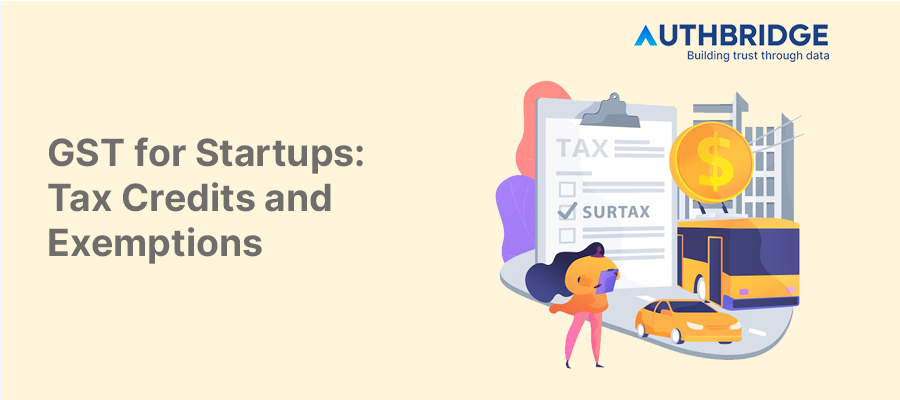Navigating GST Tax Credits And Exemptions For Startups

The Role of GST in Fostering Startup Growth
The Goods and Services Tax (GST) regime in India has been a game-changer for the startup ecosystem, simplifying the tax structure and ensuring a level playing field for businesses of all sizes. By consolidating multiple taxes into a single framework, GST has reduced the tax burden on startups, enabling them to focus on growth and innovation. This section will explore how GST has contributed to creating a conducive environment for startups.
Overview of GST Benefits for Startups
GST offers several benefits for startups, including tax credits, exemptions, and simplified compliance procedures. These benefits are designed to reduce the financial strain on new businesses and support their expansion efforts. An overview of these benefits will provide startups with the knowledge needed to leverage GST for their advantage.
GST Exemptions for Startups
Criteria for GST Exemptions
Startups in India can avail of GST exemptions if they meet specific criteria set by the government. These criteria often relate to annual turnover, the nature of goods or services provided, and other regulatory requirements. Understanding these criteria is crucial for startups to determine their eligibility for exemptions.
Types of GST Exemptions Available to Startups
Several types of GST exemptions are tailored to support startups, including exemptions on certain goods and services, threshold exemptions, and special category exemptions. This section will detail the various exemptions startups can avail of and how these can impact their tax liabilities.
Tax Credits under GST for Startups
Understanding Input Tax Credit (ITC)
One of the most significant advantages of GST for startups is the Input Tax Credit (ITC), which allows businesses to reduce their GST liability by claiming credit for the tax paid on inputs. This section will explain the concept of ITC and its importance for startups.
Eligibility and Claiming Process for ITC
To benefit from ITC, startups must meet certain eligibility criteria and follow a specific process for claiming these credits. This part will guide startups through the eligibility requirements and the step-by-step process to claim ITC effectively.
GST Registration for Startups
Mandatory Registration Threshold
Startups with an annual turnover exceeding the mandatory registration threshold must register under GST. This section will discuss the threshold limits and the implications of GST registration for startups.
Process and Documentation Required
The GST registration process involves submitting an application along with necessary documents. This part will outline the registration process, including the documents required and tips for a smooth registration experience.
Compliance and Reporting under GST
Filing GST Returns: Frequency and Types
Startups registered under GST are required to file periodic returns, detailing their sales, purchases, and tax liabilities. This section will cover the types of GST returns, filing frequency, and deadlines that startups need to be aware of.
Record-Keeping for GST Compliance
Proper record-keeping is essential for GST compliance. Startups must maintain accurate records of their transactions, taxes paid, and credits claimed. This part will highlight the importance of record-keeping and the types of records startups should maintain.
Challenges and Solutions
Navigating GST Compliance Challenges
Startups often face challenges in navigating the GST compliance landscape, including understanding tax rates, managing ITC, and adhering to filing deadlines. This section will address common challenges and offer solutions to help startups manage GST compliance effectively.
Leveraging Technology for GST Management
Technology can play a crucial role in simplifying GST compliance for startups. This part will explore how startups can leverage technology, such as GST software and apps, to streamline tax calculations, filing, and record-keeping.
Conclusion
Impact of GST on Startup Ecosystem
GST has had a profound impact on India's startup ecosystem, promoting ease of doing business and encouraging entrepreneurship. This concluding section will reflect on the positive changes brought about by GST and how it has helped startups thrive.
Future Outlook for GST and Startups
As the GST framework continues to evolve, it is essential for startups to stay informed about regulatory changes and adapt their strategies accordingly. The future outlook for GST and startups is promising, with ongoing reforms expected to further ease the tax burden and support business growth.
Category

Abhinandan Banerjee
(Associate Manager - Marketing)
Abhinandan is a dynamic Product and Content Marketer, boasting over seven years of experience in crafting impactful marketing strategies across diverse environments. Known for his strategic insights, he propels digital growth and boosts brand visibility by transforming complex ideas into compelling content that inspires action.



